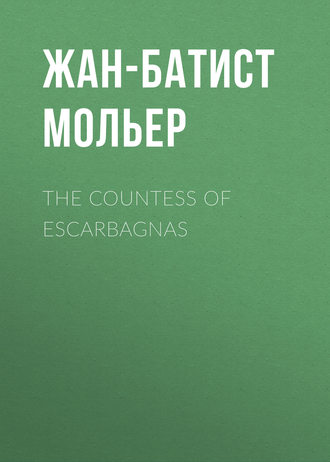
Мольер (Жан-Батист Поклен)
The Countess of Escarbagnas
SCENE V. – THE COUNTESS, JULIA, ANDRÉE
And. What is it you want, Ma'am?
Coun. You do make people scream after you, you servants!
And. I was putting your muff and head-dress away in the cup … in the closet, I mean.
Coun.Call in that rascal of a page.
And. I say, Criquet!
Coun. Cease that "Criquet" of yours, stupid, and call out "Page."
And. Page then, and not Criquet, come and speak to missis. I think he must be deaf. Criq… Page! page!
SCENE VI. – THE COUNTESS, JULIA, ANDRÉE, CRIQUET
Cri. What is it you want?
Coun. Where were you, you rascal?
Cri. In the street, Ma'am.
Coun. Why in the street?
Cri. You told me to go outside.
Coun. You are a rude little fellow, and you ought to know that outside among people of quality, means the ante-room. Andrée, mind you ask my equerry to flog this little rogue. He is an incorrigible little wretch.
And. Whom do you mean by your equerry, Ma'am? Is it Mr. Charles you call by that name?
Coun. Be silent, impertinent girl! You can hardly open your month without making some rude remark. (To CRIQUET) Quick, some seats; (to ANDRÉE) and you, light two wax candles in my silver candlesticks; it is getting late. What is it now? why do you look so scared?
And. Ma'am.
Coun. Well – Ma'am – what is the matter?
And. It is that …
Coun. What?
And. I have no wax candles, but only dips.
Coun. The simpleton! And where are the wax candles I bought a few days ago?
And. I have seen none since I have been here.
Coun. Get out from my presence, rude girl. I will send you back to your home again. Bring me a glass of water.
SCENE VII. – THE COUNTESS and JULIA
(making much ceremony before they sit down)
Coun. Madam!
Ju. Madam!
Coun. Ah! Madam!
Ju. Ah! Madam!
Coun. Madam, I beg of you!
Ju. Madam, I beg of you!
Coun. Oh! Madam!
Ju. Oh! Madam!
Coun. Pray, Madam!
Ju. Pray, Madam!
Coun. Now really, Madam!
Ju. Now really, Madam!
Coun. I am in my own house, Madam! We are agreed as to that. Do you take me for a provincial, Madam?
Ju. Oh! Heaven forbid, Madam!
SCENE VIII. – THE COUNTESS, JULIA, ANDRÉE (who brings a glass of water), CRIQUET
Coun. (to ANDRÉE). Get along with you, you hussy. I drink with a salver. I tell you that you must go and fetch me a salver.
And. Criquet, what's a salver?
Cri. A salver?
And. Yes.
Cri. I don't know.
Coun. (to ANDRÉE). Will you move, or will you not?
And. We don't either of us know what a salver is.
Coun. Know, then, that it is a plate on which you put the glass.
SCENE IX. – THE COUNTESS, JULIA
Coun. Long live Paris! It is only there that one is well waited upon; there a glance is enough.
SCENE X. – THE COUNTESS, JULIA, ANDRÉE
(who brings a glass of water, with a plate on the top of it), CRIQUET
Coun. Is that what I asked you for, dunderhead? It is under that you must put the plate.
And. That is easy to do. (She breaks the glass in trying to put it on the plate.)
Coun. You stupid girl! You shall really pay for the glass; you shall, I promise you!
And. Very well, Ma'am, I will pay you for it.
Coun. But did you ever see such an awkward loutish girl? such a …
And. I say, Ma'am, if I am to pay for the glass, I won't be scolded into the bargain.
Coun. Get out of my sight.
SCENE XI. – THE COUNTESS, JULIA
Coun. Really, Madam, small towns are strange places. In them there is no respect of persons, and I have just been making a few calls at houses where they drove me almost to despair; so little regard did they pay to my rank.
Ju. Where could you expect them to have learnt manners? They have never been to Paris.
Coun. Still, they might learn, if they would only listen to one; but what I think too bad is that they will persist in saying that they know as much as I do – I who have spent two months in Paris, and have seen the whole court.
Ju. What absurd people!
Coun. They are unbearable in the impertinent equality with which they treat people. For, in short, there ought to be a certain subordination in things; and what puts me out of all patience is that a town upstart, whether with two days' gentility to boast of or with two hundred years', should have impudence enough to say that he is as much of a gentleman as my late husband, who lived in the country, kept a pack of hounds, and took the title of Count in all the deeds that he signed.
Ju. They know better how to live in Paris, in those large hotels you must remember with such pleasure! That Hotel of Mouchy, Madam; that Hotel of Lyons, that Hotel of Holland, what charming places to live in!3
Coun. It is true that those places are very different from what we have here. You see there people of quality who do not hesitate to show you all the respect and consideration which you look for. One is not under the obligation of rising from one's seat, and if one wants to see a review or the great ballet of Psyche, your wishes are at once attended to.
Ju. I should think, Madam, that during your stay in Paris you made many a conquest among the people of quality.
Coun. You can readily believe, Madam, that of all the famous court gallants not one failed to come to my door and pay his respects to me. I keep in my casket some of the letters sent me, and can prove by them what offers I have refused. There is no need for me to tell you their names; you know what is meant by court gallants.
Ju. I wonder, Madam, how, after all those great names, which I can easily guess, you can descend to Mr. Thibaudier, a councillor, and Mr. Harpin, a collector of taxes? The fall is great, I must say. For your viscount, although nothing but a country viscount, is still a viscount, and can take a journey to Paris if he has not been there already. But a councillor and a tax-gatherer are but poor lovers for a great countess like you.
Coun. They are men whom one treats kindly in the country, in order to make use of when the need arises. They serve to fill up the gaps of gallantry, and to swell the ranks of one's lovers. It is a good thing not to leave a lover the sole master of one's heart, lest, for want of rivals, his love go to sleep through over-confidence.







